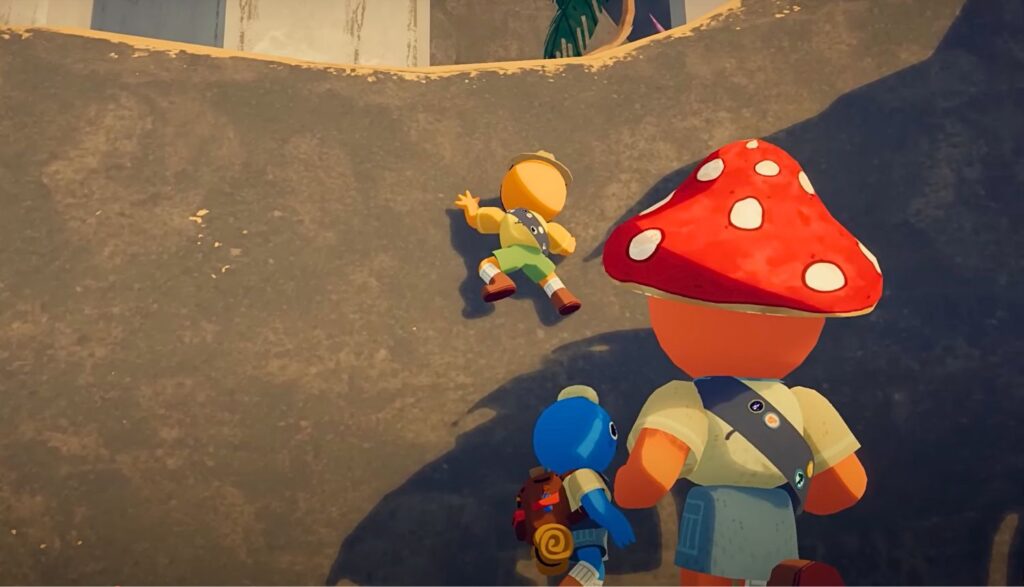
You may not have heard of it, but a quirky little co-op climbing game called Peak is surprising people. This “game-jam” creation—collectively constructed over the course of a month by a group of gamemakers—sold a million copies in its first 9 days on Steam and 4.5 million in its first month.
Peak is a simple-looking, first-person game that keeps things as elementary and tutorial free as possible. After boarding a plane for who knows where, you crash land (à la ABC’s survival drama Lost) on a tiny island.
Your only direction comes via a small “How Not to Die” guidebook you find nestled in the sand. The book’s author, Scoutmaster Myers, lays out the basic moves at your disposal and leaves you with two essential rules: Don’t abandon any fellow travelers. And rule No. 2: Get to the nearby mountain peak for rescue. Then it’s up to you and your buds to find the mountain and climb.
That may sound like an incredibly simple goal for a game. (It is.) Maybe even kinda boring. (It’s not.) The whole challenge of Peak is a combination of cooperative climbing; managing your resources and stamina; and avoiding death from the puzzling environmental traps and biomes along the way.
But mostly, it’s all about the stamina.
Your stamina meter decreases as you climb. And if you don’t find ground on which to stop, walk or rest you’ll run out of that energy juice and fall off the mountain. If you find valuable items and stick them in your backpack, the extra weight will eat stamina, too. Run? Lost stamina. Jump? Lost stamina. Oh, and the longer you play, the hungrier you get, which also diminishes your stamina meter. Eat a mushroom and get poisoned, or just get flat out sleepy? Oops, there goes a chunk of the meter.
The mountains you climb are made up of distinct biomes. There’s the jungle-like Tropics biome; the icy and frigid Alpine area; the wind-swept desert Mesa; Caldera, a blazing hot lava zone; and Kiln, which is a volcano ascent with a brutal vertical climb.
Along the way, you also find suitcases dropped from your plane that deliver items such as ropes, stamina-saving pitons, flares and the like. You might also find energy drinks, which give players a separate, short-lived “super energy” meter. Lollipops give you a burst of high stamina followed by a period of resulting sleepiness. Etc.
Peak is designed as a co-op game for up to four friends online. You can play a single-player mode offline, but the challenge is much more difficult and it requires quite a bit of planning to complete. (The enjoyment factor decreases as well.)
The real fun of this game is in connecting with others via in-game voice chat and then helping one another maneuver past mountain crevasses, blazing fires, noxious traps and other climbing hazards.
If a companion falls, he or she can be knocked unconscious (and potentially die). They can, however, be carried by others to shrines that will revive them. Players can also lend a hand to a fellow climber, give them food and heal them of poison and other maladies.
Even though there is no in-game dialogue (other than player communications), players will encounter the pratfalling silliness and fun built into the game’s clunky characters and simple mechanics.
All of that said, players still encounter elements in Peak that some might find upsetting or disturbing. For instance, if players get hungry enough, their fellow climbers start looking like giant walking rotisserie chickens. Gamers can then eat another player at this point to sate their hunger. (This gaming option can be disabled in the game menu.)
In a similar manner, players will find messages from Scoutmaster Myers along the way revealing a terrible event that happened to him during his climb. And if a player leaves his fellow climbers behind, an undead skeletal scoutmaster shows up and physically throws the offender off the mountain.
There’s also an unexplained mysterious onlooker who pops up in nearby bushes and hiding spots before disappearing. And some ominous messages warn of a rising fog that appears connected to other deaths.
Players encounter magical items in the gaming mix, too. A cursed skull, for instance, instantly kills any unfortunate player who picks it up. However, the magical items and effects aren’t all negative. A faerie lantern, for example, slowly heals all status effects for players in a small radius around it, and a remedy fungus releases spores that heal nearby players.
It should also be noted that if gamers join up with random players online, those voice-chat conversations may not be family friendly.
Peak is a small survival climbing game that’s taking the gaming world by storm. However, this unrated game may not be suitable for younger players due to its frustrating climbing dangers, disturbing characters and voice-chat connections.

After spending more than two decades touring, directing, writing and producing for Christian theater and radio (most recently for Adventures in Odyssey, which he still contributes to), Bob joined the Plugged In staff to help us focus more heavily on video games. He is also one of our primary movie reviewers.